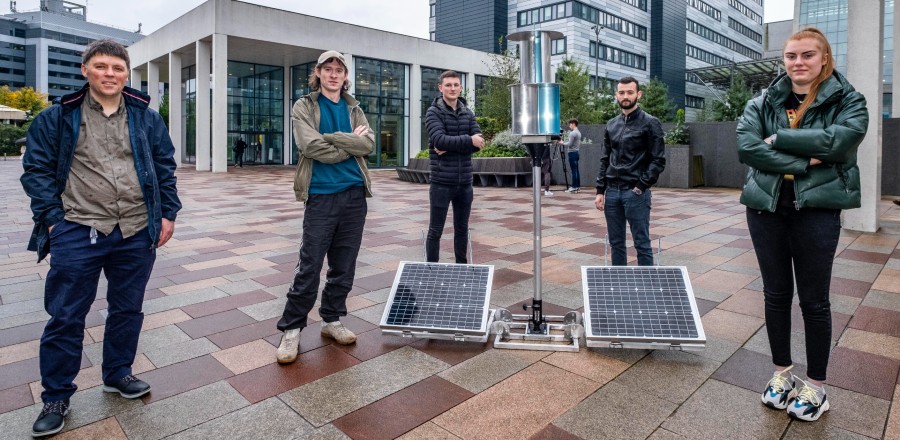Academics take flat-pack wind energy to Africa

A flat-pack wind turbine developed by Glasgow Caledonian University students is to bring low-cost power to the Kenyan economy and education thanks to UK Government funding.
The University project is to benefit from a slice of a £26m grant, which will support 64 projects in total, and is part of Innovate UK’s Energy Catalyst programme in support of its continued efforts to create and demonstrate new technologies and business models to deliver a just and inclusive clean energy transition in Africa and Asia.
The portable wind turbine, invented by Douglas Macartney when he was 15 and a pupil at Royal High in Edinburgh, was developed by several teams of undergraduate engineers from GCU, working over several years to create a viable prototype – including the addition of two solar panels.
The device, which can be assembled without any specialist training, is intended to be used to help areas recovering from natural disasters and in rural settlements far from grid connection.
Dr Andrew Cowell, a senior lecturer at GCU and Principal Investigator for the project, said: “The wind turbine was conceived to generate enough electricity to power a light and two USBs sockets in a disaster relief zone or a refugee camp. The addition of solar panels was inspired partly by Douglas’ original idea, and partly from feedback from an Innovate UK research bid partner. All our calculations show the concept is viable.”
GCU will partner DeCourcy Alexander, a London-based sustainable innovation consultancy, and E-Safiri Charging Limited, a Kenyan SME that focuses on research and innovative solutions to provide access to sustainable energy.
The funding will allow the three partners to link UK academia and small-scale rural industry in Kenya, where it is hoped the turbine will help create sustainable economic growth and education that will transform lives.
Dr Cowell said: “The technology would be able to improve energy access by making it affordable, reliable and low carbon. Our portable and flat-pack system is more feasible for deployment in rural areas and could reduce installation and transportation costs (and energy price in general) compared to a conventional system, as it is stand-alone and off-grid, making it accessible to all. The local community will be trained on the assembly and use of the device and, ultimately, there are plans to try to manufacture it in Kenya.”
The project is due to start on March 1, 2023, and will run for 12 months, including field trials at suitable locations in Scotland and Kenya. The project will be entitled Angaza Africa, Angaza being a Swahili word meaning ‘to give light, illuminate, shine’.
Simon Graham, Head of Innovation at DeCourcy Alexander, said: “Sometimes it seems that the great societal challenges are unsurmountable, but projects like Angaza Africa demonstrate that, by working together for the common good, we can make change happen. We are looking forward to working with Glasgow Caledonian University on this project and seeing the positive impact that it will have.”
